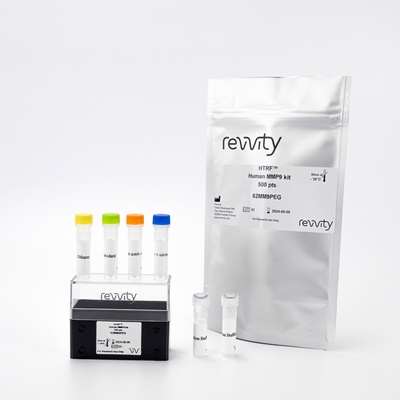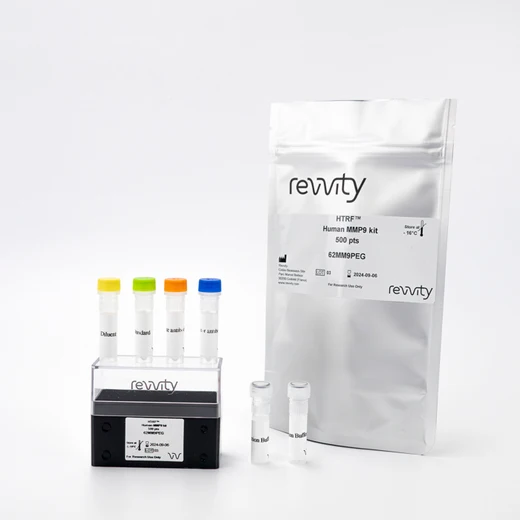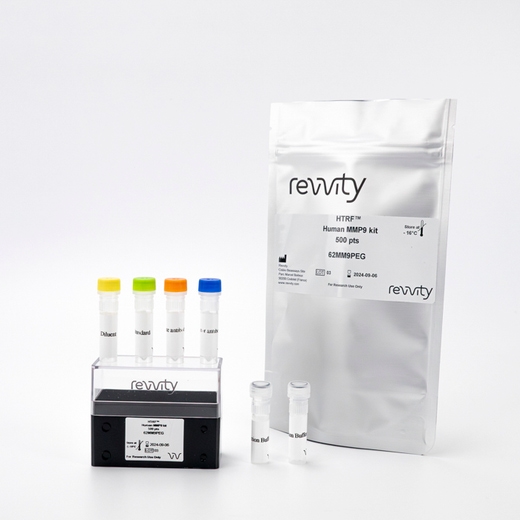

HTRF Human MMP9 Detection Kit, 10,000 Assay Points


 View All
View All
HTRF Human MMP9 Detection Kit, 10,000 Assay Points










Discover the HTRF homogeneous cell-based assay kit for the quantification of matrix metalloproteinase (MMP) 9 (gelatinase B) in human cell culture supernatants.
For research use only. Not for use in diagnostic procedures. All products to be used in accordance with applicable laws and regulations including without limitation, consumption and disposal requirements under European REACH regulations (EC 1907/2006).
| Feature | Specification |
|---|---|
| Application | Protein Quantification |
| Sample Volume | 16 µL |
Discover the HTRF homogeneous cell-based assay kit for the quantification of matrix metalloproteinase (MMP) 9 (gelatinase B) in human cell culture supernatants.
For research use only. Not for use in diagnostic procedures. All products to be used in accordance with applicable laws and regulations including without limitation, consumption and disposal requirements under European REACH regulations (EC 1907/2006).





HTRF Human MMP9 Detection Kit, 10,000 Assay Points





HTRF Human MMP9 Detection Kit, 10,000 Assay Points





Product information
Overview
HTRF Human MMP9 assay is designed to measure the concentrations of MMP-9 (pro- and active forms) in cell culture supernatants of human origin.Matrix metalloproteinase (MMP) 9, also known as gelatinase B, is a zinc-dependent endopeptidase secreted as an inactive proenzyme which is then activated by proteolytic cleavage. MMP9 plays a significant role in tissue repair and remodeling by degrading structural components of the extracellular matrix (ECM), such as collagens, gelatin, and elastin. This endopeptidase also has crucial functions in cell growth, migration, inflammation, and angiogenesis by processing a variety of non-ECM molecules such as cytokines and chemokines (e.g. pro-TGF-β, pro-TNF-α, CXCL1, CXCL8, IFN-β).Its enzymatic activity is regulated by interaction with its physiological inhibitors, the tissue inhibitors of metalloproteinases TIMP1 and TIMP2, that block the access of substrates to the catalytic domain of the enzyme.MMP-9 is mainly regulated at the level of transcription by several growth factors, cytokines, and bacterial products including LPS.Upregulation of MMP9, leading to MMP9-TIMP1/2 imbalances, has been linked to tissue fibrosis, cancer, diabetes, arthritis, and cardiovascular diseases. The secretion of this biomarker is therefore a common end point measured when investigating such diseases and to find new drugs.
Specifications
| Application |
Protein Quantification
|
|---|---|
| Brand |
HTRF
|
| Detection Modality |
HTRF
|
| Product Group |
Kit
|
| Sample Volume |
16 µL
|
| Shipping Conditions |
Shipped in Dry Ice
|
| Target Class |
Biomarkers
|
| Target Species |
Human
|
| Technology |
TR-FRET
|
| Therapeutic Area |
Cardiovascular
Metabolism/Diabetes
NASH/Fibrosis
Oncology & Inflammation
|
| Unit Size |
10,000 Assay Points
|
Video gallery

HTRF Human MMP9 Detection Kit, 10,000 Assay Points

HTRF Human MMP9 Detection Kit, 10,000 Assay Points

How it works
Assay principle
Cisbio's Human MMP9 assay is based on a TR-FRET sandwich immunoassay involving two specific anti-human MMP9 antibodies, one labelled with europium (Eu3+) cryptate (donor) and the other with d2 (acceptor). Both antibodies bind to human MMP9, and the donor-acceptor proximity enables a fluorescent TR-FRET signal. The intensity of the signal is proportional to the concentration of human MMP9 present in the sample.

Assay Protocol
Cisbio's Human MMP9 assay can be run in a 96- or 384-well low volume white plate (20 µL final). As described here, cellular samples or standards are dispensed directly into the assay plate for the detection of human MMP9 by HTRF® reagents. The antibodies labelled with HTRF fluorophores may be pre-mixed and added in a single dispensing step. No washing steps are needed. The protocol can be further miniaturized or upscaled by simply resizing each addition volume proportionally.The assay can be performed on frozen or freshly prepared cellular samples, and the HTRF signal can be recorded with most TR-FRET multimode plate readers.

Assay validation
MMP-9 upregulation induced by LPS and PMA in the human hepatic stellate cell line LX-2*
The human hepatic stellate cell line LX-2* was plated in a 96-well plate (50,000 cells/well) in complete culture medium. The day after, cells were treated for 24h with 100 µL of increasing doses of LPS or PMA in FBS-free medium supplemented with 0.2% BSA. Cell supernatants were collected for the quantitative measurement of secreted MMP9 levels. In accordance with data from the literature, LPS treatment leads to a dose-dependent increase in the secretion of human MMP9. Cell treatment with PMA for 24h induces an upregulation of the secreted level of human MMP9.
*Provided by EMD Millipore (product number #SCC064)


MMP-9 upregulation induced by PMA and ROS in the human breast cancer cell line MCF-7
The human breast cancer cell line MCF-7 was plated in a 96-well plate in complete culture medium. The day after, cells were treated for 24h with 50 µL of increasing doses of PMA or H2O2 diluted in FBS-free medium supplemented with 0.5% BSA. Cell supernatants were collected for the quantitative measurement of secreted MMP9 levels. As expected, cell exposure to PMA or H2O2 for 24h leads to a dose-dependent increase in the secretion of human MMP9.


Correlation between HTRF Human MMP9 assay kit and a commercial ELISA
A side-by-side comparison between HTRF Human MMP9 assay kit and a commercial ELISA was performed on cell supernatants of LX-2* cells treated with PMA for 24h (in FBS-free medium + 0.2% BSA).The two methods are very well correlated, as demonstrated by the value of the correlation coefficient (r) which was close to 1.
*Provided by EMD Millipore (product number #SCC064)

Resources
Are you looking for resources, click on the resource type to explore further.
This guide provides you an overview of HTRF applications in several therapeutic areas.


How can we help you?
We are here to answer your questions.






























